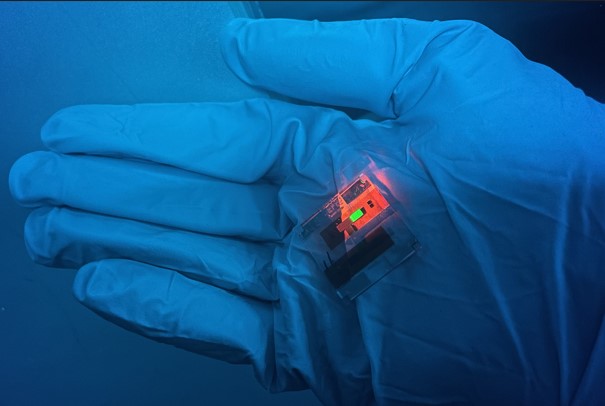Photon energy upconversion with organic opto-electronics
PhD - Hasselt | More than two weeks ago
Optical energy upconverters offer opportunities to increase the efficiency of solar cells and improve sub-surface, near-infrared medical imaging. Encouraged by this strategic potential, several material and device classes have been developed to transform near-infrared (NIR) into visible light. Nevertheless, all upconverter approaches to date fail to be both efficient, self-powered and safe with the use of abundant elements. The goal of this Ph.D. project is to close this gap, by making use of a novel organic, stacked diode-based device architecture able to achieve upconversion without the need for an external power supply (see picture demonstrating a bias-less red-to-green upconversion device). The wavelength range of this device will be extended deeper into the NIR by using recently developed state-of-the-art organic semiconductors with higher absorption and emission efficiencies. This project further relies on optical simulations to maximize the in- and outcoupling of the absorbed and emitted photons and to take photon recycling within the device into account. The liberation from the need of an external voltage results in strongly reduced dark current and shot noise, making these upconversion devices particularly suitable for NIR imaging, which will be demonstrated by the fabrication and optimization of a bio-compatible upconversion foil for NIR in vivo imaging under low-light conditions. The Ph.D. project will be conducted as part of an interdisciplinary and multicultural team of highly skilled scientists who work toward next-generation, sustainable and ultraflexible optoelectronic devices based on alternative (organic) semiconductors. The research will be performed at the imo-imomec Physics/Engineering building located on the campus of Hasselt University in Diepenbeek (Belgium). These facilities contain state-of-the-art laboratories and equipment for both the material and device aspects of this Ph.D. project.

Required background: Engineering Technology, Engineering Science, Physics, Materials Science or equivalent
Type of work: 70% experimental, 20% modelling/simulation, 10% literature
Supervisor: Wouter Maes
Co-supervisor: Wouter Maes
Daily advisor: Koen Vandewal
The reference code for this position is 2025-180. Mention this reference code on your application form.
